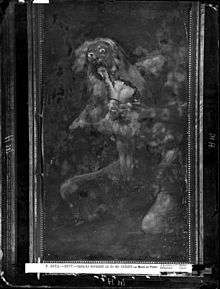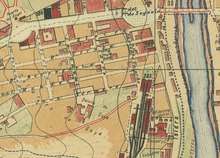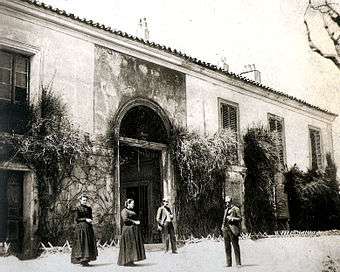Quinta del Sordo

The Quinta del Sordo (English: Villa of the Deaf), or Quinta de Goya, was the name of an extensive estate and country house situated on a hill in the old municipality of Carabanchel on the outskirts of Madrid. The house is best known as the home of Francisco de Goya in the years leading up to his exile, and where he painted the Black Paintings comprising fourteen murals. Contrary to popular belief, the estate was given its name due to the deafness of a prior owner, having nothing to do with Goya himself. The house was demolished in 1909.
Goya's ownership

Francisco de Goya purchased the home on February 27, 1819[3] from a prior owner who was deaf. Goya lived in the home until his exile to Bordeaux in 1824, whereupon he left his grandson Mariano in charge of the estate. During the brief periods when he would return to Madrid, Goya would stay at the home.[4] Several reasons have been suggested for Goya's purchase of the estate. Given Goya's liberalism, it would have been somewhat important to him to distance himself from the totalitarian court of Fernando VII. After the fall of Rafael del Riego in 1823, Goya felt it necessary to leave the country and move to Bordeaux.
Gallery
- The Quinta de Goya, or Quinta del Sordo, in a scale model built between 1828-1830. Museum of History. Madrid
 Mansion of the heirs of Goya, in the Quinta del Sordo, c. 1900. Magazine La Ilustración Española y Americana on July 15, 1909
Mansion of the heirs of Goya, in the Quinta del Sordo, c. 1900. Magazine La Ilustración Española y Americana on July 15, 1909 Mansion of the successors of Goya. Postcard, c. 1907
Mansion of the successors of Goya. Postcard, c. 1907
See also
References
- ↑ "La Quinta de Goya", magazine Descubrir el Arte, nº 201, November 2015, pp. 18-24. ISSN 1578-9047
- ↑ Carlos Teixidor, "Fotografías de Laurent en la Quinta de Goya", Descubrir el Arte, nº 154, December de 2011, pp. 48-54.
- ↑ SÁNCHEZ y DURÁN. Op. cit. p. 207.
- ↑ BOZAL. Op. cit.
External links
![]() Media related to Quinta del Sordo at Wikimedia Commons
Media related to Quinta del Sordo at Wikimedia Commons
- El libro de Yriarte, original, de 1867, sobre Goya. El libro clásico de Yriarte (en francés).
- Blanca Flaquer (dir.), Valeriano Bozal (asesor), «Las pinturas negras, de Francisco de Goya» [vídeo en línea], La mitad invisible, www.rtve.es, 3 de enero de 2011, y 17 de marzo de 2012. Consulta: 13-08-2012.
Coordinates: 40°24′41″N 3°43′34″W / 40.4115°N 3.7260°W